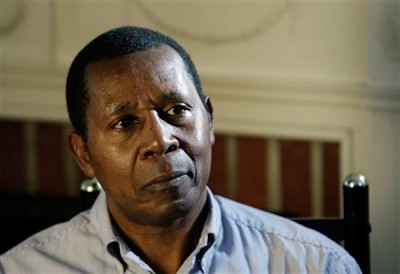Dr. Leopold Munyakazi Deported from U.S. to Reinforce Rwanda’s Official Genocide Narrative

Dr. Léopold Munyakazi was deported to Rwanda early this morning. Immigration attorney Ofelia Calderón defended the gentle professor pro bono from the time of his arrest in 2009 to the Fourth Circuit Court of Appeals, where she gave oral argument earlier this year.
Dr. Munyakazi is a linguist, scholar, and former French professor at Goucher College, who was arrested after giving several lectures at northeastern campuses in which he challenged the Rwandan government’s official, legally enforced description of the Rwandan massacres of the 1990s as “genocide against the Tutsi.” The U.S. government and the Clinton dynasty are both deeply committed to the same description, which has become a cornerstone of U.S. foreign policy. Top officials including the U.S. president, UN Ambassador and Secretary of State frequently tell us that we are obliged to intervene in other sovereign nations to stop genocide because we failed to do so in Rwanda.
Munyakazi said that the Rwandan massacres were the result of a longstanding class conflict, not an ethnic conflict, and that they were therefore incorrectly characterized as genocide. Hutus and Tutsis, he said, are not properly understood as ethnicities. They share the same language and culture, eat the same food, and marry each other, and the vast majority are Christian.
Although Dr. Munyakazi was arrested shortly after giving his controversial talks, anonymous witnesses soon accused him of genocide crime in Rwanda in 1994. These accusations were made more than ten years after the genocide, and despite the fact that Dr. Munyakazi had been a free man in Rwanda before emigrating to the United States.
Christine Frechard, Dr. Munyakazi’s friend in Pittsburgh, Pennsylvania, said that she was able to speak to him on the phone before he boarded the plane and that he remained in good spirits. Responding to her distress, she said, he told her not to worry, that it was going to be all right, and that he remained committed to his truth. Frechard said that she is contacting Amnesty International, the International Red Cross, and foreign embassies in Kigali to ask them to keep watch over Léopold’s welfare in custody.
Dr. Munyakazi joins three other celebrated political prisoners in Rwanda. They are Victoire Ingabire, who attempted to run against President Paul Kagame in 2010, Deo Mushayidi, the former president of the Rwandan Journalists Association, and Kizito Mihigo, a popular Rwandan gospel singer who recorded a song in which he sang that members of both groups, Hutu and Tutsi, were victims in the Rwandan war and that both must be remembered in order for Rwandans to heal.
Mihigo was arrested shortly after recording that song and sentenced to ten years for plotting to murder the president and bring down the Rwandan government.

